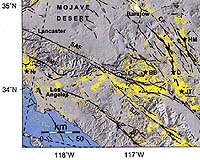 Having lived my whole life in California, I've never been particularly frightened of earthquakes. Appropriately concerned, of course, and certainly alarmed during one, but not terrified. This is undoubtedly due to the bolt-from-the-blue nature of quakes; you don't know when the big one is going to hit, so there's no use worrying about it -- just stock up on water, canned food, and blankets, and be ready to deal with it when it happens. Which could be today... or a century from now.
Having lived my whole life in California, I've never been particularly frightened of earthquakes. Appropriately concerned, of course, and certainly alarmed during one, but not terrified. This is undoubtedly due to the bolt-from-the-blue nature of quakes; you don't know when the big one is going to hit, so there's no use worrying about it -- just stock up on water, canned food, and blankets, and be ready to deal with it when it happens. Which could be today... or a century from now.
If Vladimir Keilis-Borok at UCLA's Institute of Geophysics and Planetary Physics is right, though, such carefree days of "if it happens, it happens" may be coming to a close. Keilis-Borok, whose team uses a "combination of pattern recognition, geodynamics, seismology, chaos theory and statistical physics" to predict earthquakes, asserts that there's a 50-50 chance of a major earthquake hitting a stretch of east-central Califorina by September 5. Residents in the (potentially) affected area should stock up on water and canned food -- the group successfully predicted two previous quakes last year using this method, an 8.1 quake in Japan and the 6.5 near San Simeon in California in December.
If the methodology bears out -- and Keilis-Borok emphasizes that two good predictions are not enough to justify calling the technique a success -- then we may be moving into an era when regions can be given alerts months in advance of high likelihood of quake activity. Even without being able to pinpoint the exact date and epicenter, a prediction such as that given for the Mojave region would be enough to save lives, as it makes people more apt to build up earthquake supplies and to have their residences checked for structural soundness.
So far, the prediction have been for quakes in areas with relatively low populations -- central California or off the coast of Hokkaido. If the technique works, what happens when the prediction happens for a densely-populated area? A six to nine month prediction window is close enough to trigger prompt action, but not so close to as cause panic. Would people evacuate, or ride it out? At the very least, such forecasts would give governments and groups like the Red Cross/Red Crescent time to build up on emergency response materials. Being able to predict earthquakes would be enormously valuable.
So if you hear about an earthquake in the Mojave Desert some time over the next couple of months, remember that it's a good sign that the world has changed.